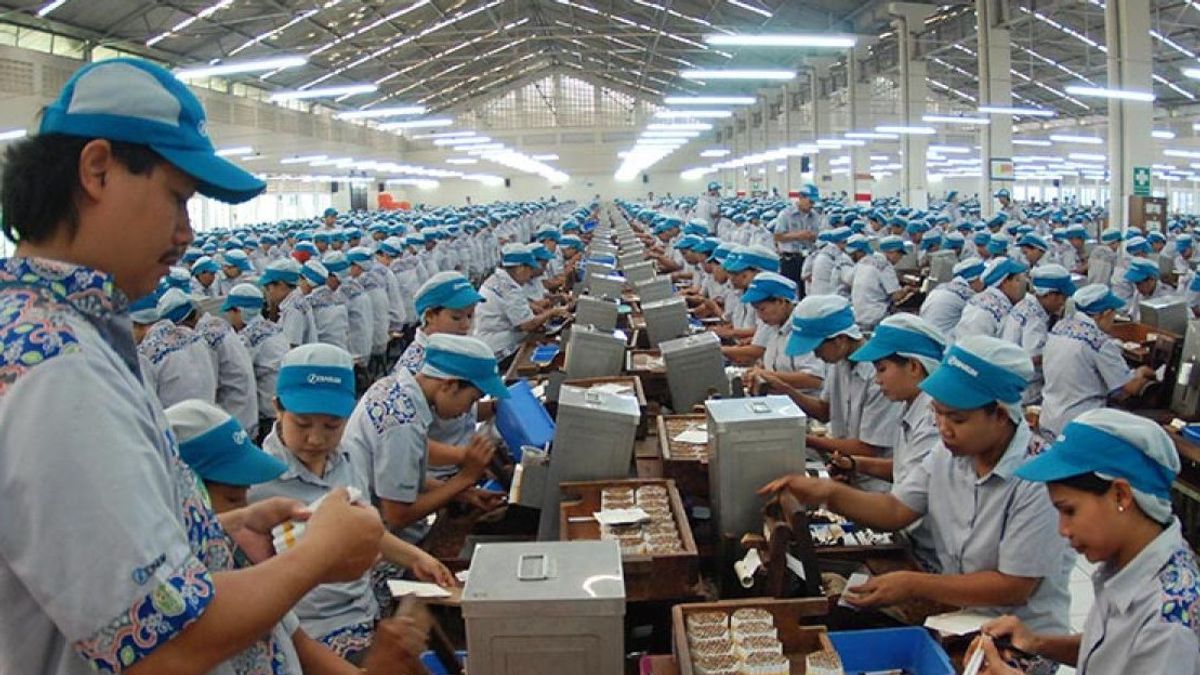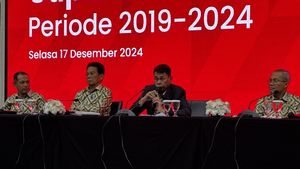JAKARTA - Regional Leaders of the Federation of Workers at Tobacco Cigarettes, Food and Beverage Unions, All-Indonesian Workers' Unions (PD FSP RTMM-SPSI) of the Special Region of Yogyakarta (DIY) continue to strive for the fate and protect the livelihoods of its members who work in the tobacco industry. Advocacy of the Tobacco Products Industry is a priority agenda in order to maintain the survival of the workers who mostly work in the cigarette factory sector, especially in the midst of the high wave of Termination of Job Relations (PHK) that occurs nationally.
The head of the DIY RTMM-SPSI FSP Regional Leadership, Waljid Budi Lestarianto, stated that working in the tobacco industry is a matter of pride for members of the DIY RTMM-SPSI FSP, which reaches around 5,250 people, because it is a source of halal and legal income.
The majority of our members who work in the JagaretKretek Tangan (SKT) sector are great women who are the backbone of the family. Currently, there are no other jobs that can absorb thousands of workers with limited education other than the tobacco industry," he explained at the 'Ngobrol Together Novida Kartika Hadi' activity at the Semar Kitchen Restaurant, quoted Thursday, October 10.
Now, the tobacco industry is facing various challenges, including the issuance of Government Regulation Number 28 of 2024 (PP Kesehatan) which includes regulations that have a negative impact on the tobacco industry sector. In it, there is a ban on the sale of cigarettes within a radius of 200 meters from educational units and a ban on outdoor media advertising within a radius of 500 meters.
The rejection of the problematic article on PP Kesehatan has been strongly voiced from various parties to date. Although the rejection is very massive, the Ministry of Health continues to repress the tobacco industry by drafting a Draft Regulation of the Minister of Health (Perkes Design) on the Security of Tobacco Products and Electronic Cigarettes which is targeted to be ratified during the transition period of government.
In the Draft Permenkes, there are rules that will uniform all cigarette packaging to become a 448C pantone color. This rule removes brand identities that are the difference between the types of cigarettes and others, or known as plain cigarette packaging policies without brands. Of course, the RTMM-SPSI DIY FSP, which consists mostly of SKT workers, firmly rejects this Ministry of Health regulation.
We are concerned and very disappointed with the rules pushed by the Ministry of Health. We firmly reject the problematic articles on PP Health and the rules for packaging plain cigarettes without a brand on the Draft Permenkes. This rule will threaten our livelihood sources, even though the wave of layoffs is happening everywhere. The government also does not have an alternative job field solution but the Ministry of Health has instead designed a new rule that will destroy our source of income, he is worried about.
This concern is corroborated by the fact that currently, the tobacco industry is trying to recover and waiting for the realization of excise policies that are reportedly not rising. PD FSP RTMM-SPSI DIY views that the government's decision not to increase cigarette excise in 2025 is the right step considering that the industry is being hit by various pressures due to increasingly stringent regulations. However, the decision not to increase excise in 2025 is expected not to be justified by the government to increase excise drastically in 2026.
"On the occasion of absorbing the aspirations of regional head candidates, we convey the aspirations of the workers who ask that tobacco-related regulations should consider the fact that the tobacco industry is a labor-intensive sector. Therefore, we really hope that prospective leaders of the tobacco industry's production center have an understanding of our existence and provide protection to the sustainability of this sector from excessive regulations, such as plain cigarette packaging without a brand and high excise increases. When elected, don't forget the points that we have conveyed. Don't even support the regulation. Draft Permenkes which is actually a burden on the new government, "explained Waljid.
The candidate for the Regent of Kulon Progo, Novida Kartika Hadi, said he understood how important the tobacco industry is to the regional economy and the welfare of the community, especially through the absorption of labor in Kulon Progo. Therefore, he promised to continue to support and develop this sector through various proactive and sustainable policies.
One of the regulations that is highlighted and considered burdensome and reaping various current rejections is Regional Regulation Number 5 of 2014 concerning Non-Smoking Areas (PerdaKTR). He encouraged a review of the regulation if many people felt it was inappropriate to implement it in Kulon Progo.
If indeed many Kulon Progo people reject this rule, we can conduct public hearings. Then review and for example, it can be revised for certain burdensome articles, such as restrictions on cigarette sponsorship and other restrictions. Everything must be seen objectively," he added.
Not only that, Novida also highlighted the zoning policy for the prohibition of selling and banning advertising of tobacco products in PP 28/2024 as well as standardizing the packaging or packaging of plain cigarettes without a brand in the Draft Permenkes. For him, this kind of rule is unfair and ironic if it is enforced, especially in the Kulon Progo area which is one of the centers of national tobacco products.
Moreover, Novida plans to increase Kulon Progo's Regional Original Revenue (PAD) if elected as regent. Therefore, he rejects any regulations that can suppress regional investment.
"The business scale must be limited by various strict regulations regardless of what the history is like, it doesn't feel fair. The rules must be in accordance with the existing culture in society, and we need a policy that can increase investment so that our PAD can grow," he added.
So, PD FSP RTMM-SPSI DIY hopes that regional leaders in Kulon Progo can continue to fight for the rights of workers to get a decent job and livelihood. This is because the tobacco industry has become a source of livelihood for thousands of workers in DIY.
SEE ALSO:
Waljid continued that his party has three recommendations addressed to regional head candidates in Kulon Progo. First, PD FSP RTMM-SPSI DIY asks regional head candidates to provide protection and support for the sustainability of the tobacco industry, including through fair regional policies and in accordance with reality in the field.
Candidates for regional heads are also expected to optimize the use of Tobacco Products Excise Sharing Funds (DBH CHT) and formulate local regulations related to fair cigarettes, including reviewing the regulation of the Kulon Progo Regency non-smoking area which is very burdensome to the tobacco industry.
Second, the Regional Government needs to avoid excessive tobacco policy and threaten workers' livelihoods. This includes canceling the plan to pack plain, brandless cigarettes in the Draft Permenkes and revising PP 28/2024, especially articles that burden the tobacco industry.
Third, PD FSP RTMM-SPSI DIY asks regional head candidates to protect cigarette factory workers and workers by ensuring that there is no increase in cigarette excise by 2025 and avoiding a drastic increase in excise in 2026.
Through today's activity, we hope to get protection from potential regional heads to ensure the sustainability of our livelihoods. The tobacco industry is a labor-intensive industry that has become a field for PD FSP RTMM-SPSI DIY members," he concluded.
The English, Chinese, Japanese, Arabic, and French versions are automatically generated by the AI. So there may still be inaccuracies in translating, please always see Indonesian as our main language. (system supported by DigitalSiber.id)
















